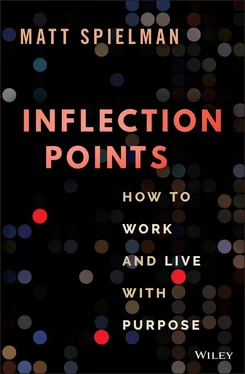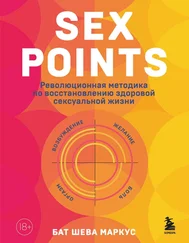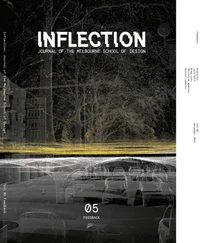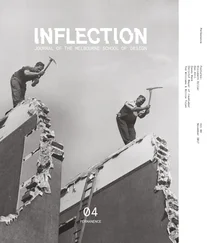Matt Spielman - Inflection Points
Здесь есть возможность читать онлайн «Matt Spielman - Inflection Points» — ознакомительный отрывок электронной книги совершенно бесплатно, а после прочтения отрывка купить полную версию. В некоторых случаях можно слушать аудио, скачать через торрент в формате fb2 и присутствует краткое содержание. Жанр: unrecognised, на английском языке. Описание произведения, (предисловие) а так же отзывы посетителей доступны на портале библиотеки ЛибКат.
- Название:Inflection Points
- Автор:
- Жанр:
- Год:неизвестен
- ISBN:нет данных
- Рейтинг книги:3 / 5. Голосов: 1
-
Избранное:Добавить в избранное
- Отзывы:
-
Ваша оценка:
- 60
- 1
- 2
- 3
- 4
- 5
Inflection Points: краткое содержание, описание и аннотация
Предлагаем к чтению аннотацию, описание, краткое содержание или предисловие (зависит от того, что написал сам автор книги «Inflection Points»). Если вы не нашли необходимую информацию о книге — напишите в комментариях, мы постараемся отыскать её.
Inflection Points: How to Work and Live with Purpose
Inflection Points
Inflection Points — читать онлайн ознакомительный отрывок
Ниже представлен текст книги, разбитый по страницам. Система сохранения места последней прочитанной страницы, позволяет с удобством читать онлайн бесплатно книгу «Inflection Points», без необходимости каждый раз заново искать на чём Вы остановились. Поставьте закладку, и сможете в любой момент перейти на страницу, на которой закончили чтение.
Интервал:
Закладка:
Thank you, Pete Moore. You taught me the Win the Day mantra, which I use and have shared with hundreds of clients. Thank you for also bringing me into your organization and letting me interact with your all-star team.
Dr. Terrence Maltbia, I want to thank you and your team at the Columbia Coaching Certification Program. The rigor of the training has helped fuel the results my clients and I have been able to achieve. And from one university to another, I would like to thank Lauren Murphy, Kristin Fitzpatrick, and the entire team at Harvard Business School's Career & Professional Development Group. Working with CPD and having the opportunity to talk to and coach students and alumni has been one of the most rewarding and meaningful endeavors in my career.
I would like to thank Michael Levin, my writing partner on Inflection Points . Without you, this book could not have become a reality. You pushed me and provided encouragement and guidance along the way – especially when it was necessary. You have become a dear friend and I am better off for having gotten to know you through this process.
And finally, I would like to thank my mom, Sherry Bennett Warshauer. You are my mom, my friend, and my inspiration. I look up to you and everything that you have done and everything that you are. I cherish our relationship.
1 WHAT'S YOUR GAME PLAN?
Professional success often conceals a gnawing conflict at one's core—a vague but undeniable sense of lack, that something is askew, off-kilter, or out of place. Even as you pile up accomplishments and accolades, and ascend through the hierarchy of your field, a lingering question resonates in your mind like a ticking clock, or like the steady drip-drip-drip of a faucet as you lie awake in the still of the night: Is this really the life I am meant to be living? Is this the life I want? And if it's not, how do I get it?
Henry David Thoreau wrote in 1854 that “the mass of men lead lives of quiet desperation,” 1 locked in a cycle of daily toil interrupted only by brief bouts of leisure that offer a momentary reprieve, but fail to address the frustrating feeling of existential befuddlement.
The world has changed since Thoreau's era, but the observation remains as incisive as ever, and it applies to people from all walks of life, from trades to top-tier executive positions. They know there's more they want to get out of life, whether it's more personal satisfaction, a more meaningful contribution to the world, more community connection, more financial security, more intellectual stimulation, or simply more free time to spend alone or with family. But each time they ponder how to find what it is they want—or to know with certainty what they want in the first place—self-doubt blocks action. Is it really possible to have a life and career that is engaging, gratifying, and satisfying?
I know this kind of angst is real because I see it in the clients I coach. I know it's real because I lived under the mantle of quiet desperation myself, for many years, until I realized my purpose in helping others find theirs.
In those days, if you looked at my life from the outside, you might assume I was completely satisfied. At the start of my professional career in 1997, I was working as a salesperson for a prominent investment bank. Although I was working among people much more experienced, I was holding my own, surrounded by all kinds of high achievers. It was a thriving, heady environment, and we were on the rise.
But I wasn't ready to settle in. Something deep inside of me had questions. I felt I could be doing something different. I lacked a sense of personal connection and satisfaction with how I was spending my time. And all around me I observed many others mired in the same grind. They were earning top salaries, but no matter how much they pulled in, the money wasn't rewarding. Some of my colleagues had an irrepressible enthusiasm for the work, but others were, like me, out of place—slogging through each day in anticipation of the next paycheck.
That Thoreau passage was one that came back to me over and over again. Working in that financial ecosystem, I saw a controlled kind of desperation all around me, and I started to understand that I did not belong there. To the contrary, I felt that my real calling in life was to help people escape that kind of desperation. I knew I could help people put their feelings into words, and move those feelings into action. My desire was to be someone who could energize individual lives and careers in a way that would electrify their existence with a clear-eyed passion and a strong intentionality.
My transition from finance to coaching was a long and winding road. I've had many positions in across several industries, and each has been a valuable step to get me to where I am today. There were aspects of my financial career that I enjoyed, but I knew it could not sustain me. A moderately fulfilling life was unacceptable to me. I had to step out of that very traditional job and experience my own setbacks and detours before I found what it was I was looking for. The realization that I had to get out of “the known” and step into “the unknown” was the first stride down what has been a transformative and invigorating path toward the work I do now.
HOW CAN YOU TELL YOU ARE STUCK?
Stasis, stagnation, a sense of being stymied or sedated—these are telltale signs that your mind or soul is crying out for a change. The longing for change usually appears within us before we know how to bring it about—and we rarely know the type of “change” we really need. It's just that something's gotta give . But inertia can be an overpowering force that keeps us in place.
We may feel dread and anxiety when we should be feeling anticipation and excitement. Other times, it can be less dramatic. We'll feel a general flatness, and a lack of zest for the things we know should make us happy. You don't have to call it depression (though it may be), but it is the metaphor of living in black and white versus living in color.
In some cases, the problem is that we may set artificially low expectations for ourselves. We just accept that, when it comes to our jobs or our personal lives, there is a certain level of dissatisfaction (the existential toll) that one pays for a stable life and a steady paycheck.
These moments, when you candidly consider whether you are fulfilled, should not be ignored. They are alarm bells that announce it's time for some serious introspection. What do you need? What do you want? And how will you attain it? Only by honest examination can you find the courage to make a change.
It's not merely a question of the work you do. While many of my clients seek me out for career guidance, the problem or challenge just as often lies with some other aspect of their life. Some may believe for a lifetime that career is the primary vehicle for self-actualization, only to discover that the intellectual and creative satisfaction they desire comes from a realm outside of the office. Many of my clients are executives who are happy with their career and comfortable in their current role, but seek new means of success or new challenges to invigorate that role, and make it resonate with their personal strengths.
Moreover, achieving change is not merely a matter of “goal setting,” which is an activity that is perhaps not always understood in the self-development and coaching world. You can't goal-set your way out of an emotional rut because the process of setting and pursuing goals, as conventionally practiced, is inherently crippled by a myopic oversight; these methodologies emphasize articulating goals but rarely ask you to interrogate why you're chasing them in the first place. That is the gaping hole at the center of many “self-improvement” regimens: they don't really examine what the individual holds dear, what he values, or what makes him tick. It is vital to have structure, but it has to be full circle—not linear.
Читать дальшеИнтервал:
Закладка:
Похожие книги на «Inflection Points»
Представляем Вашему вниманию похожие книги на «Inflection Points» списком для выбора. Мы отобрали схожую по названию и смыслу литературу в надежде предоставить читателям больше вариантов отыскать новые, интересные, ещё непрочитанные произведения.
Обсуждение, отзывы о книге «Inflection Points» и просто собственные мнения читателей. Оставьте ваши комментарии, напишите, что Вы думаете о произведении, его смысле или главных героях. Укажите что конкретно понравилось, а что нет, и почему Вы так считаете.











